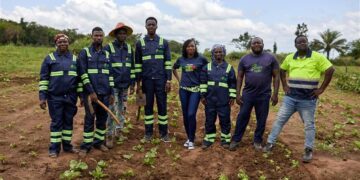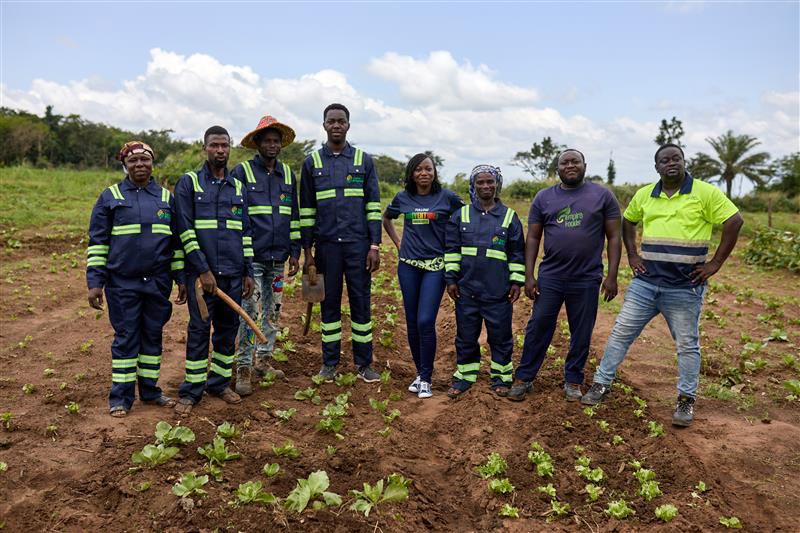Starting a business anywhere in the world takes grit. In Ghana, it can take twice as much.
Ask any entrepreneur here and the story is often the same. You will hear comments like, finding capital is hard, technology can be out of reach, skilled labor is scarce, and access to markets is not easy.
The odds are much steeper when opportunities themselves seem limited, especially on this side of the Mediterranean. Yet, in the face of these challenges, a quiet transformation is taking shape, and it’s happening in the country’s oldest industry: agriculture.
For decades, Ghana’s agriculture sector was dominated by small-scale subsistence farming. But now, driven by new technology, changing mindsets, and targeted investment, it is attracting a wave of young, ambitious entrepreneurs.
Ghana’s economy is driven largely by services (46.8%), industry (29.7%), and agriculture (23.5%). However, Agriculture is gradually proving resilient, moving away from the basics to a more modern, tech-driven industry.
Tullow Ghana, a leading oil and gas operator, has been tapping into this momentum.
Through its flagship Tullow Agriventures Programme (TAP), run in partnership with the Innohub Foundation, the company is working to strengthen Ghana’s agribusiness sector by tackling weak points in the value chain, including training, market access and financing.
The multi-year initiative has ambitious targets, including the launch of 600 new agribusinesses, supporting 30 existing ventures expand and creating 1,500 direct jobs and 4,500 indirect ones. The interest areas for the programme range from crop production, rice and fish farming to agribusiness startups.
Last year alone, about 440 small enterprises received a mix of funding and tailored training to scale up their operations and the impact is already visible in communities across the country.
In Ghana’s Eastern Region, a single mother who once struggled to feed her children now runs a profitable soybean farm. Before TAP’s intervention, sending her children to school was out of reach. Today, she is full of smiles as she talks about paying school fees and reinvesting in her farm.
In Aveyime, in the Volta Region, a young woman who left school after junior high, spoke of the joy of making about Ghc10,000 every six-months from her crop farm, due to Tullow’s support.
One of the main features of the TAP initiative, is its startup fund for agribusiness entrepreneurs. Last year, ten young business owners — selected through a competitive pitch process received $10,000 each in seed funding, repayable over time. This year, the number of beneficiaries will double to twenty.
Apart from the financial package, every recipient also undergoes six to twelve months of business training, covering everything from financial management to marketing and supply chain operations, all designed to make success stick. The initiative is working, as Tullow Social Performance Manager, Fiifi Enchill says: “These small businesses are seeing growth and are able to employ new human resource to support their ventures. Most of these young entrepreneurs are seeing an increase of 188% in profitability, which is truly remarkable.”
The funding operates on a revolving model. Repayments are reinvested into other promising ventures, creating a pipeline of opportunity. Innohub Foundation, the programme’s implementing partner, monitors each business closely to ensure funds are used effectively and repayments are on track.
“We’ve seen remarkable commitment from these entrepreneurs,” says Innohub Executive Director Nelson Amo. “With the right tools, they’re creating sustainable businesses that can change lives.”
For Tullow Ghana’s Deputy Managing Director, Cynthia Lumor, the connection between an oil company and agriculture is not as unlikely as it might seem. “We believe in the potential of young entrepreneurs in agribusiness to make a real contribution to Ghana’s economic growth,” she says. “Our role is to help them get there, as part of our broader commitment to building a better future through responsible oil and gas development.”
This commitment reflects a broader trend: major corporations investing in sectors outside their immediate business to strengthen communities and diversify economies. In Ghana’s case, it also helps address youth unemployment and food security, two of the most critical national priorities.
There is no doubt about it; agriculture in Ghana still faces deep challenges. Climate change, market volatility, and infrastructure gaps remain nagging obstacles but the early results from Tullow’s initiative is showing that targeted, well-managed support can tip the balance for small businesses. Even if it is too soon to measure the full impact, the available evidence shows great promise.




















